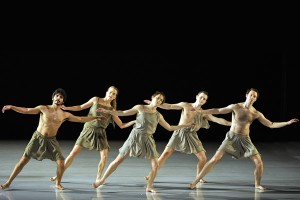Arts & Entertainment
Arts news in brief: Jan. 28
‘Faux queen’ pageant at Ziegfeld’s, another dance company at the Kennedy Center and more
Gay-helmed dance company at George Mason next weekend
He is the dancing world’s strapping bad boy, with a fullback’s girth and at 6 feet, 2 inches tall, he towers over many other dancers, though these days he is now largely retired from performing. And he has been called by Time Magazine “the most prodigiously gifted choreographer of the post-Balanchine era.”
He is 54-year-old Mark Morris, founder and still chieftain of the world-renowned Mark Morris Dance Group, now in its 30th year during a 17-month-long anniversary season touring to 20 cities including the D.C. area on Feb. 5 and 6, in performances and discussions at George Mason University in Fairfax, Va.
Morris, who is gay, was born in Seattle in 1956, and at the age of 16, after graduating early from high school, traveled to Spain where, at the time, he felt he was destined to be a flamenco dancer. But because of the fascist repression of the Franco regime, he returned to the U.S. and in 1976 began living with other artists in a loft in Hoboken, N.J., and performing in New York City.
In 1980, with a collection of friends, he staged a concert of his own choreography and called them the Mark Morris Dance Group. Since then, he has worked with Mikhail Baryshnikov to found the White Oak Dance Project and has been much in demand as a ballet choreographer, most notably with the San Francisco Ballet, and for staging operas for the Metropolitan Opera in New York City. In 2001, his company moved into its first permanent headquarters, the Mark Morris Dance Center in Brooklyn.
Open about his sexual orientation, Morris has been outspoken also on the topic of marriage equality, though he chooses to call gay marriage “queer marriage.”
“We have been coming to Fairfax many years,” says Morris, who looks to the D.C. area for its “steady and devoted audience for what we do.”
This includes his plan to perform the D.C.-area premiere of “Petrichor,” set to the music of Brazilian composer Heitor Villa-Lobos, which first premiered in Boston in 2010. The company will also perform three classical works from the Morris repertory — 1990’s “Going Away Party,” set to music by Bob Willis and His Texas Playboys; 1999’s “Silhouettes,” set to music by Richard Cumming; and 2008’s “Excursions,” set to music by 20th century gay American composer Samuel Barber.
Performances are at 8 p.m. Friday and Saturday, Feb. 4 and 5, at George Mason University’s Center for the Arts at its campus, at the intersection of Braddock Road and Route 123, in Fairfax City, Va. Tickets are $22, $36 and $44, by phone at 888-945-2468 or visit www.cfa.gmu.edu. — David Hoffman
Alvin Ailey dance company celebrates 50th at Kennedy Center
The Alvin Ailey American Dance Theater is celebrating its 50th anniversary with seven performances at the Kennedy Center (2700 F St., N.W.) starting Tuesday. It’s named after the choreographer, a gay groundbreaker in his field who died of AIDS in 1989.
All of the group’s performances will include “Revelations,” a tribute to Ailey’s African-American heritage that uses traditional spirituals to explore the places of “deepest grief and holiest joy in the human soul,” as their promo material states.
On Tuesday at 7 p.m., Feb. 4 at 7:30 p.m. and Feb. 5 at 1:30 p.m., the company will be performing “Anointed,” “Cry and the Hunt” in addition to “Revelations.”
On Wednesday and Thursday at 7:30 p.m.,, the company will perform “Night Creature,” “The Evolution of a Secured Feminine” and the “Prodigal Prince” as well as “Revelations.”
The second performance on Feb. 5 at 7:30 p.m. and the Feb. 6 performance at 1:30 p.m. will include “Three Black Kings,” “In/Side” and “Forgotten Time.”
On Feb. 5 after the matinee, there will be a free post-performance discussion with a moderator and members of the company.
Tickets range from $30 to $99 and can be purchased online at kennedy-center.org. — David Hoffman
Show tunes and cocktails continue at the Jefferson
After its kick off in December, “Show Tunes and Cocktails at the Jefferson” continues as a monthly sing-along in the Jefferson’s Quill Bar (1200 16th St., N.W.) Monday from 7 to 10 p.m.
Orchestra leader Glenn Pearson, a Helen Hayes Board member, will be playing the piano “to encourage everyone in attendance to shed their inhibitions” and sing.
“For many years, following our annual October benefit, several guests stayed and broke into an impromptu gathering to sing show tunes around the piano with [Pearson],” says Linda Levy Grossman, Helen Hayes President and CEO said in a press release for the event. “Now it’s become a signature part of the evening.”
Specialty cocktails and featured appetizers will be available and attendees will have an opportunity to win Washington Theatre TixCertificates (flexible $20 gift certificates redeemable at almost 50 theaters throughout D.C.).
The Jefferson is donating 20 percent of the proceeds to support the Helen Hayes organization.
Admission is free and discounted parking is available with validation. — Juliette Ebner
Drag queen contest for ‘real’ women to be held
A contest for women born as biologically female but with drag sensibilities will be held Sunday at Ziegfeld’s at 3 p.m.
The Imperial Court of Washington is hosting Miss Faux Queen, an event modeled after female impersonation contests and a similar pageant that was held in San Francisco in the ’90s. There will be four categories — interview, international costume, interview and talent.
Contestants will dress similarly to drag queens with padding, wigs, makeup and more. All contestants will have a “drag mother” to guide them. Miss Faux Queen International is for in-town contestants while the “national” event is for out-of-town participants.
Admission is $20. Ziegfeld’s is at 1824 Half Street, S.W. Doors open at 2. For more information, e-mail to [email protected].
a&e features
Transmission DC breathes new life into a storied sound space
A fresh home for boundary-pushing culture on H Street

Late last year, phoenix-style, a fresh home for boundary-pushing culture arose on the H Street corridor. Transmission DC – a queer, trans, and POC-owned, operated, and centered community-focused venue – powered on in the former home to the Rock & Roll Hotel (famously, not a hotel, but very much rock & roll). Transmission (1353 H St., N.E.) arrives secure in its mandate – or even birthright – to provide a place to celebrate creativity and music through a lens of inclusivity and respect.
Transmission’s team brings experience, but also representation. Owners/partners Kabir Khanna (who is also programming director), Katii B, Ellie McDyre, and Kelli Kerrigan together previously managed 618 productions, a venue in Chinatown, crafting “some of D.C.’s freakiest parties, raves, and mosh pits” they note.
They packed up operations last fall to a space curated specifically for D.C.’s underground music and culture scene, building their efforts in Chinatown to bring in more fans in queer and POC circles.
Transmission, Khanna points out, is built on DIY values. In the music scene, DIY means that promoters and organizers – often disconnected from the mainstream and part of marginalized communities – build shows and programs collaboratively, but independently from institutions, supporting each other as smaller, independent venues close. Here, Transmission aims to ensure that those putting together these underground inclusive shows have a more permanent and stable home, can have access to resources, and can provide more sustainable income to artists. “We’re trying to get more people to support and enjoy the music, and also give artists and organizers within the DIY community more structure and a larger cut,” says Khanna.
Khanna also notes that Transmission operates “under the principles of safety, inclusivity, and respect.” McDyre added that even at venues that claim inclusivity, that statement might not take place in practice. We’re “not just pitting up a rainbow flag,” says McDyre, but as some of the owners are trans and POC, audiences can see themselves reflected at the top.
Much like the DIY nature of the music community, the Transmission owners brought a DIY ethos to turning around their space.
In March 2020 – the height of COVID lockdowns – Rock & Roll Hotel suddenly shuttered, though not due to the pandemic; instead, the venue claimed that decreasing sales and increasing competition led to the closure. For 14 years, it was the central spot for cheap beer and lesser-known and celebrated acts. The space stood vacant for more than five years, until Transmission turned the power back on.
“When we got into the space, it was effectively abandoned for years,” says Khanna. “There was a ton of mold, and paint primer covering all surfaces. It was nearly falling apart.” Khanna noted that many music venues like this one, regardless of how well it was maintained, “get the shit kicked out of it,” given the nature of shows. The team called in mold removal contractors, ripped up most of the floorboards, and started fresh.
Transmission’s first floor is styled as a stripped-down black box: the better to take in the music. “It’s minimal on purpose to act as a canvas for set design and music,” without a specific aesthetic, says Khanna. Moving upstairs, the second floor has been opened up, removing some walls, and now has a larger dance area than the first floor. Beyond the first two performance levels, and a holdover from Rock & Roll Hotel, is the rooftop. Though without a stage, the rooftop space is filled with murals splashed across the walls, with a full bar. Transmission’s current capacity is 496, but the team is looking to grow that number. Transmission will also leverage the full kitchen that Rock & Roll Hotel operated, bringing in Third Hand Kitchen to offer a variety of food, including vegan and vegetarian options.
Khanna pointed out an upcoming show reflective of Transmission’s inclusive ethos: Black Techo Matters on Feb. 27. The event is set to be “a dynamic, collaborative night of underground electronic music celebrating Black History Month.” Khanna says that techno came from Black music origins, and this event will celebrate this genesis with a host of artists, including DJ Stingray 313, Carlos Souffront, and Femanyst.
Movies
Moving doc ‘Come See Me’ is more than Oscar worthy
Poet Laureate Andrea Gibson, wife negotiate highs and lows of terminal illness

When Colorado Poet Laureate Andrea Gibson died from ovarian cancer in the summer of 2025, the news of their passing may have prompted an outpouring of grief from their thousands of followers on social media, but it was hardly a surprise.
That’s because Gibson – who had risen to both fame and acclaim in the early 2000s with intense live performances of their work that made them a “superstar” at Poetry Slam events – had been documenting their health journey on Instagram ever since receiving the diagnosis in 2021. During the process, they gained even more followers, who were drawn in by the reflections and explorations they shared in their daily posts. It was really a continuation, a natural evolution of their work, through which their personal life had always been laid bare, from the struggles with queer sexuality and gender they experienced in their youth to the messy relationships and painful breakups of their adult life; now, with precarious health prohibiting a return to the stage, they had found a new platform from which to express their inner experience, and their fans – not only the queer ones for whom their poetry and activism had become a touchstone, but the thousands more who came to know them through the deep shared humanity that exuded through their online presence – were there for it, every step of the way.
At the same time, and in that same spirit of sharing, there was another work in progress around Gibson: “Come See Me in the Good Light,” a film conceived by their friends Tig Notaro and Stef Willen and directed by seasoned documentarian Ryan White (“Ask Dr. Ruth”, “Good Night, Oppy”, “Pamela, a Love Story”), it was filmed throughout 2024, mostly at the Colorado home shared by Gibson and their wife, fellow poet Megan Falley, and debuted at the 2025 Sundance Film Festival before a release on Apple TV in November. Now, it’s nominated for an Academy Award.
Part life story, part career retrospective, and part chronicle of Gibson and Falley’s relationship as they negotiate the euphoric highs and heartbreaking lows of Gibson’s terminal illness together, it’s not a film to be approached without emotional courage; there’s a lot of pain to be vicariously endured, both emotional and physical, a lot of hopeful uplifts and a lot of crushing downfalls, a lot of spontaneous joy and a lot of sudden fear. There’s also a lot of love, which radiates not only from Gibson and Falley’s devotion and commitment to being there for each other, no matter what, but through the support and positivity they encounter from the extended community that surrounds them. From their circle of close friends, to the health care professionals that help them navigate the treatment and the difficult choices that go along with it, to the extended family represented by the community of fellow queer artists and poets who show up for Gibson when they make a triumphant return to the stage for a performance that everyone knows may well be their last, nobody treats this situation as a downer. Rather, it’s a cause to celebrate a remarkable life, to relish friendship and feelings, to simply be present and embrace the here and now together, as both witness and participant.
At the same time, White makes sure to use his film as a channel for Gibson’s artistry, expertly weaving a showcase for their poetic voice into the narrative of their survival. It becomes a vibrant testament to the raw power of their work, framing the poet as a seminal figure in a radical, feminist, genderqueer movement which gave voice to a generation seeking to break free from the constraints of a limited past and imagine a future beyond its boundaries. Even in a world where queer existence has become – yet again – increasingly perilous in the face of systemically-stoked bigotry and bullying, it’s a blend that stresses resilience and self-empowerment over tragedy and victimhood, and it’s more than enough to help us find the aforementioned emotional courage necessary to turn what is ultimately a meditation on dying into a validation of life.
That in itself is enough to make “Come See Me in the Good Light” worthy of Oscar gold, and more than enough to call it a significant piece of queer filmmaking – but there’s another level that distinguishes it even further.
In capturing Gibson and Falley as they face what most of us like to think of as an unimaginable future, White’s quietly profound movie puts its audience face-to-face with a situation that transcends all differences not only of sexuality or gender, but of race, age, or economic status as well. It confronts us with the inevitability few of us are willing to consider until we have to, the unhappy ending that is rendered certain by the joyful beginning, the inescapable conclusion that has the power to make the words “happily ever after” feel like a hollow promise. At the center of this loving portrait of a great American artist is a universal story of saying goodbye.
Yes, there is hope, and yes, good fortune often prevails – sometimes triumphantly – in the ongoing war against the cancer that has come to threaten the palpably genuine love this deeply-bonded couple has found together; but they (and we) know that, even in the best-case scenario, the end will surely come. All love stories, no matter how happy, are destined to end with loss and sorrow; it doesn’t matter that they are queer, or that their gender identities are not the same as ours – what this loving couple is going through, together, is a version of the same thing every loving couple lucky enough to hold each other for a lifetime must eventually face.
That they meet it head on, with such grace and mutual care, is the true gift of the movie.
Gibson lived long enough to see the film’s debut at Sundance, which adds a softening layer of comfort to the knowledge we have when watching it that they eventually lost the battle against their cancer; but even if they had not, what “Come See Me in the Good Light” shows us, and the unflinching candor with which it does so, delivers all the comfort we need.
Whether that’s enough to earn it an Oscar hardly matters, though considering the notable scarcity of queer and queer-themed movies in this year’s competition it might be our best shot at recognition.
Either way, it’s a moving and celebratory film statement with the power to connect us to our true humanity, and that speaks to a deeper experience of life than most movies will ever dare to do.
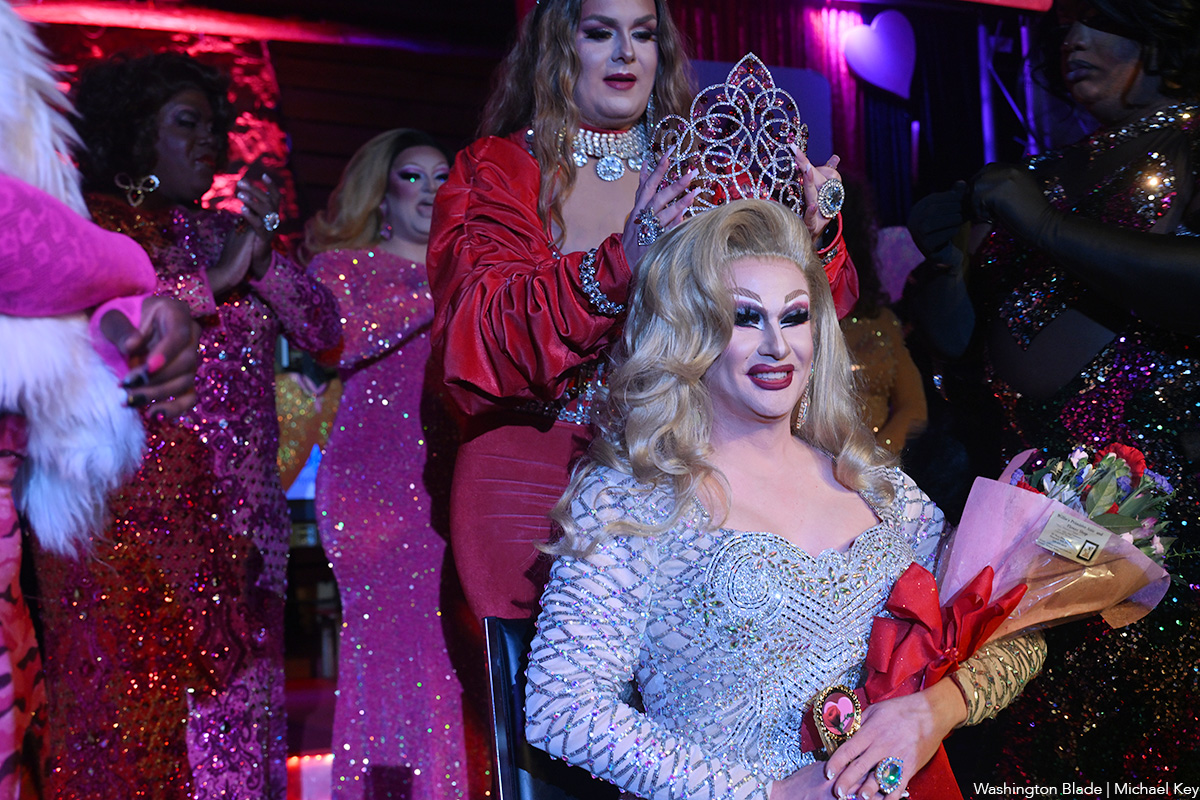
The 44th annual Queen of Hearts pageant was held at The Lodge in Boonsboro, Md. on Friday, Feb. 20. Six contestants vied for the title and Bev was crowned the winner.
(Washington Blade photos by Michael Key)
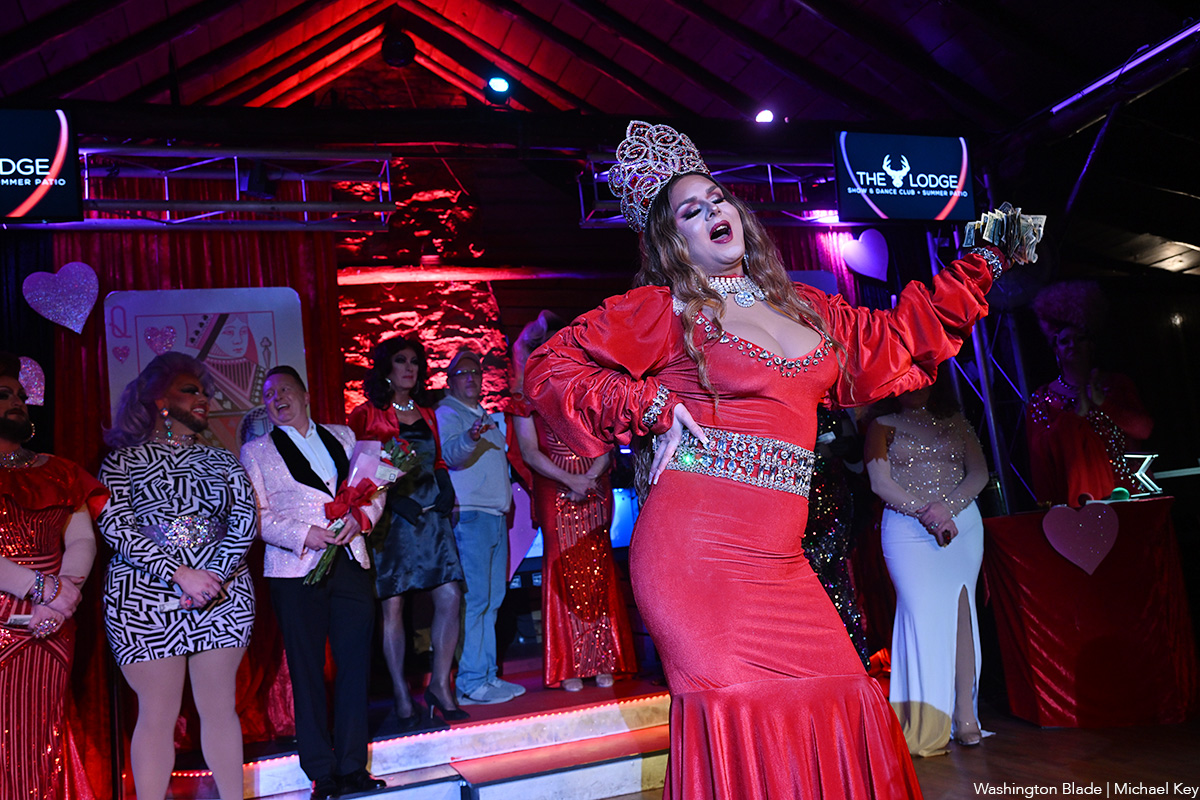
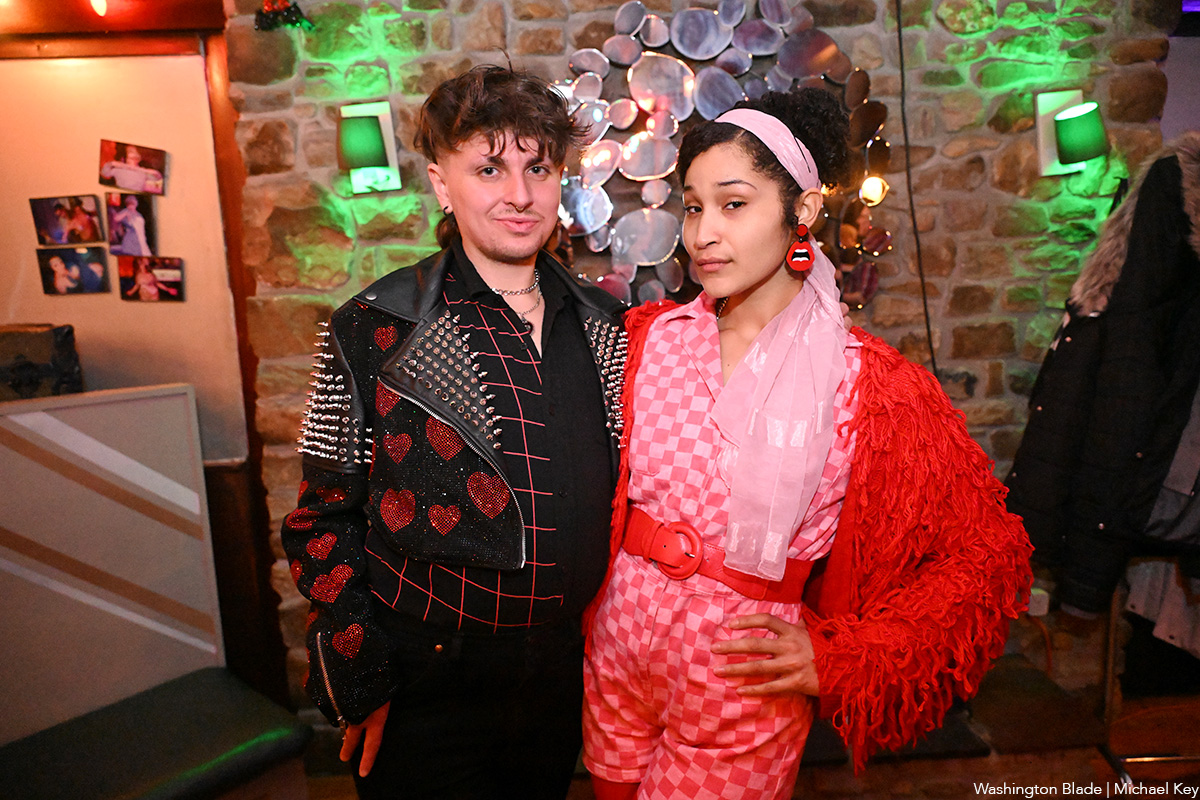
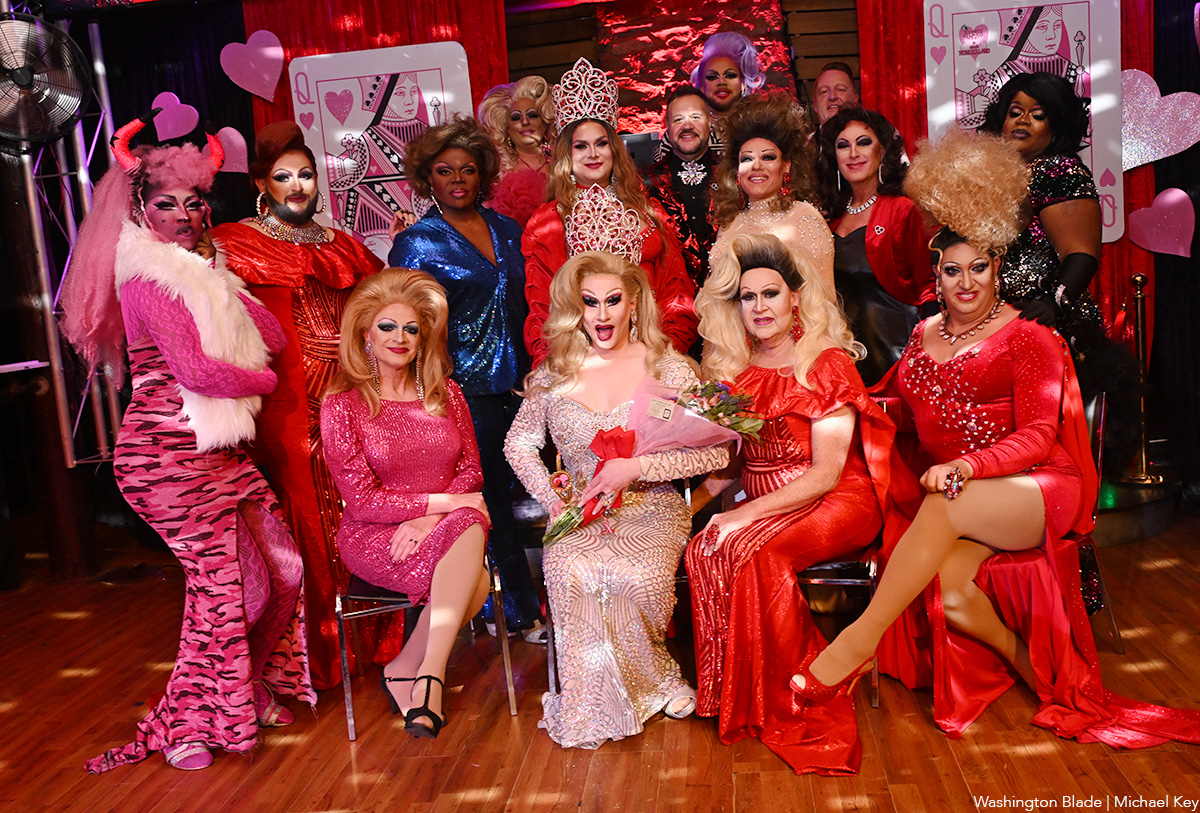
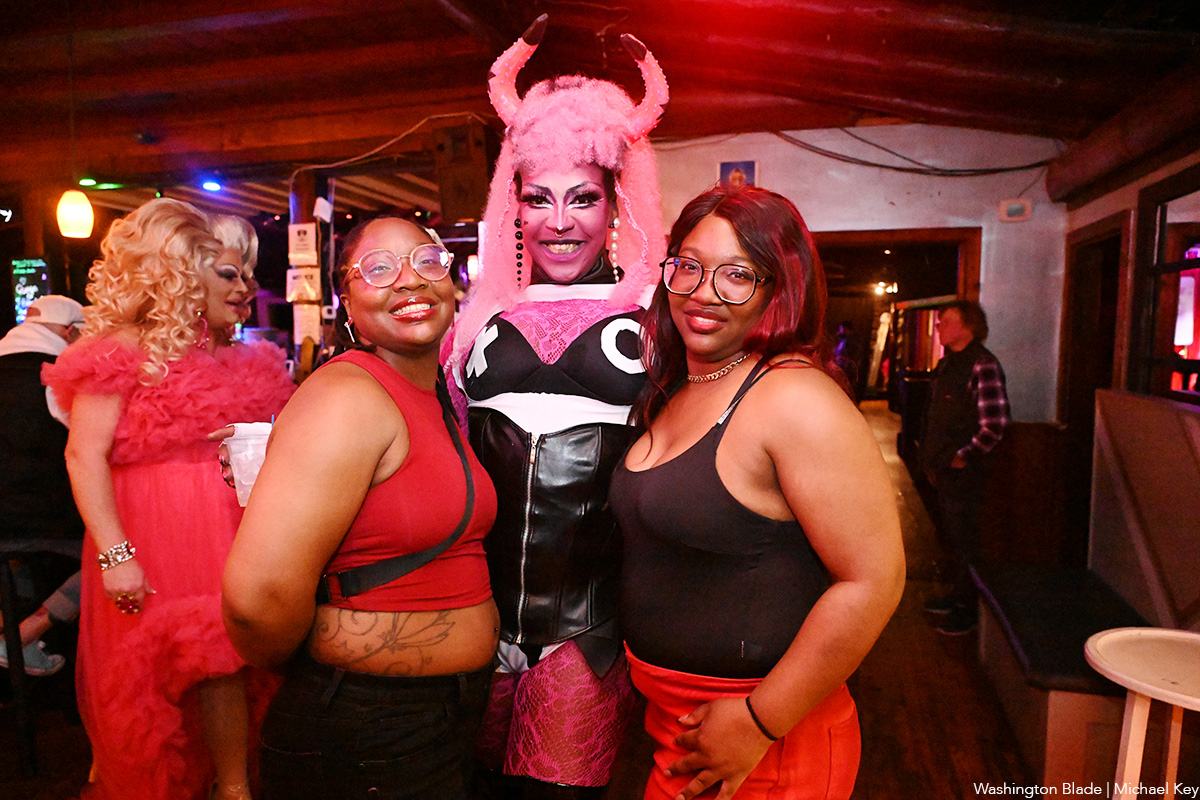
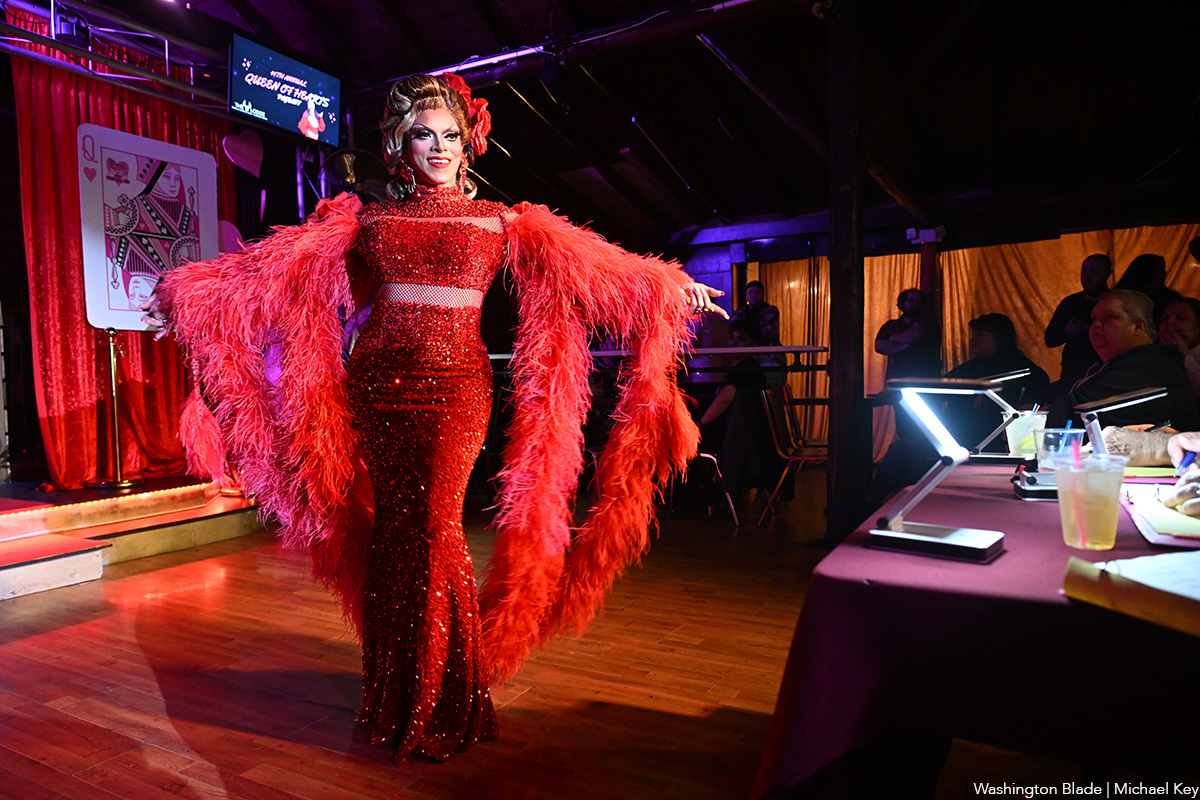
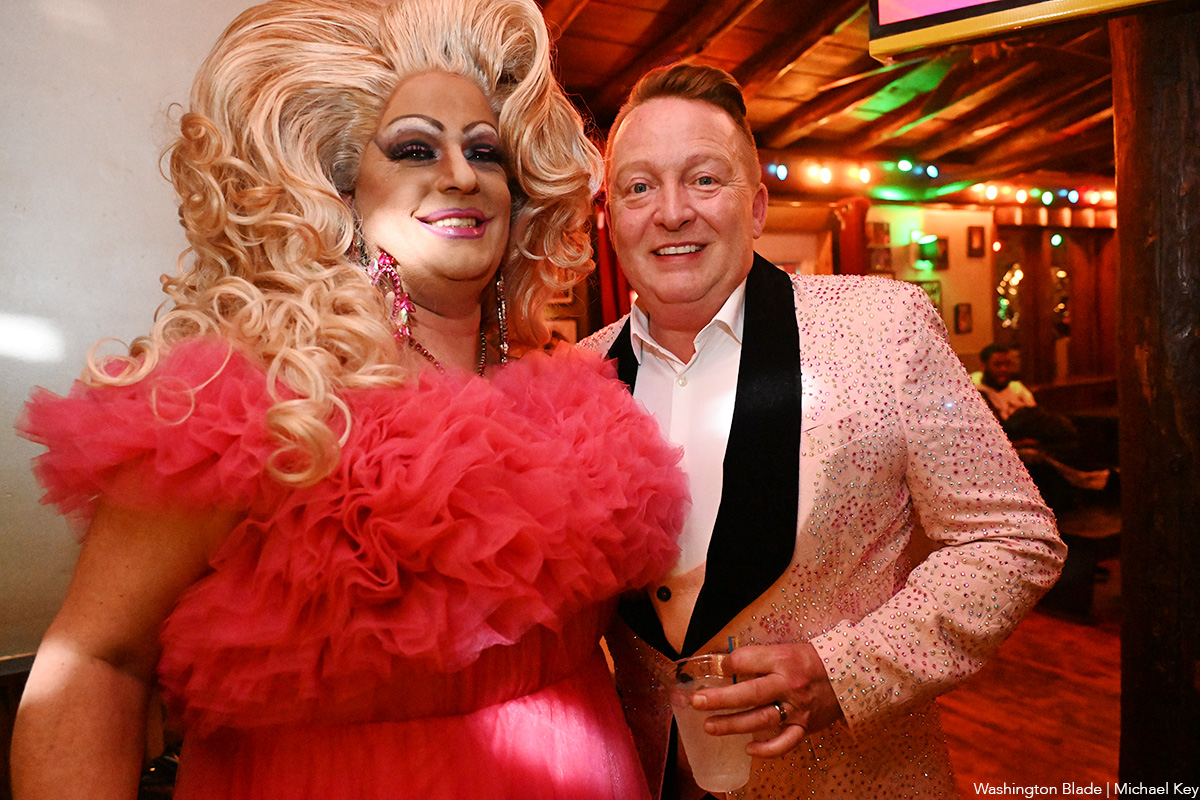
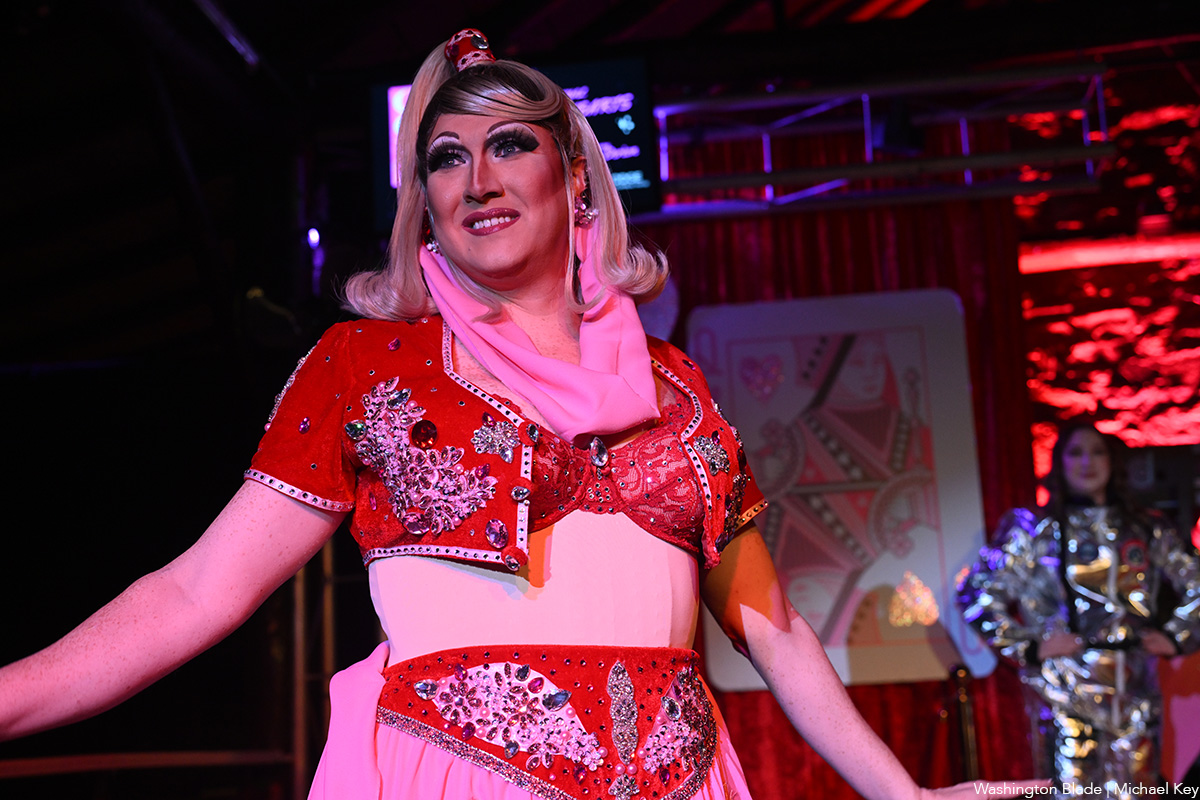
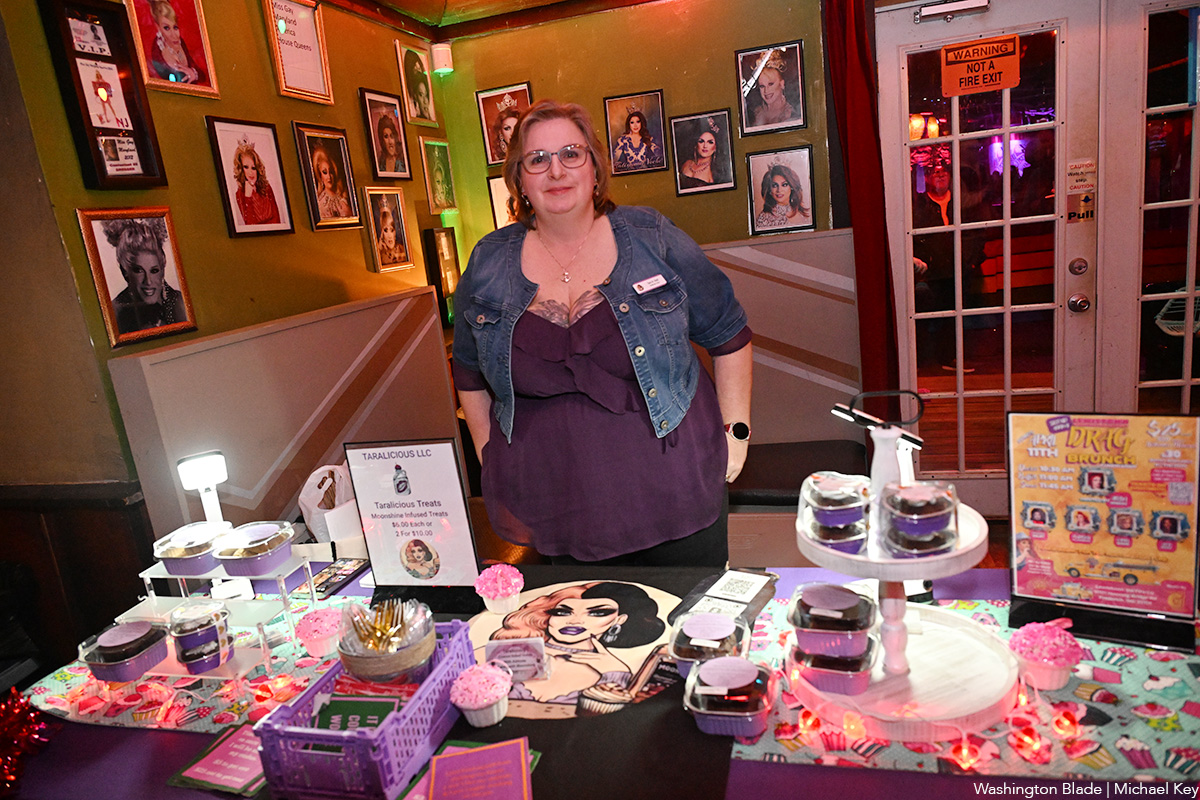
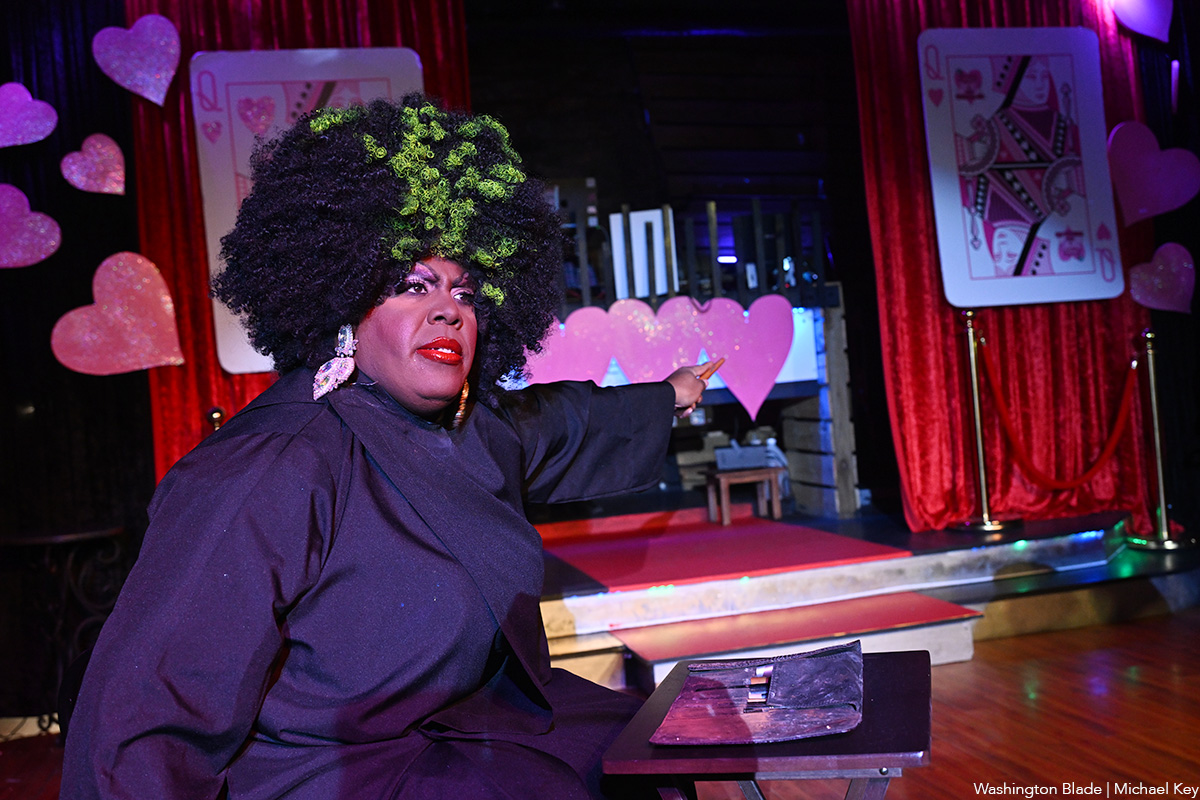
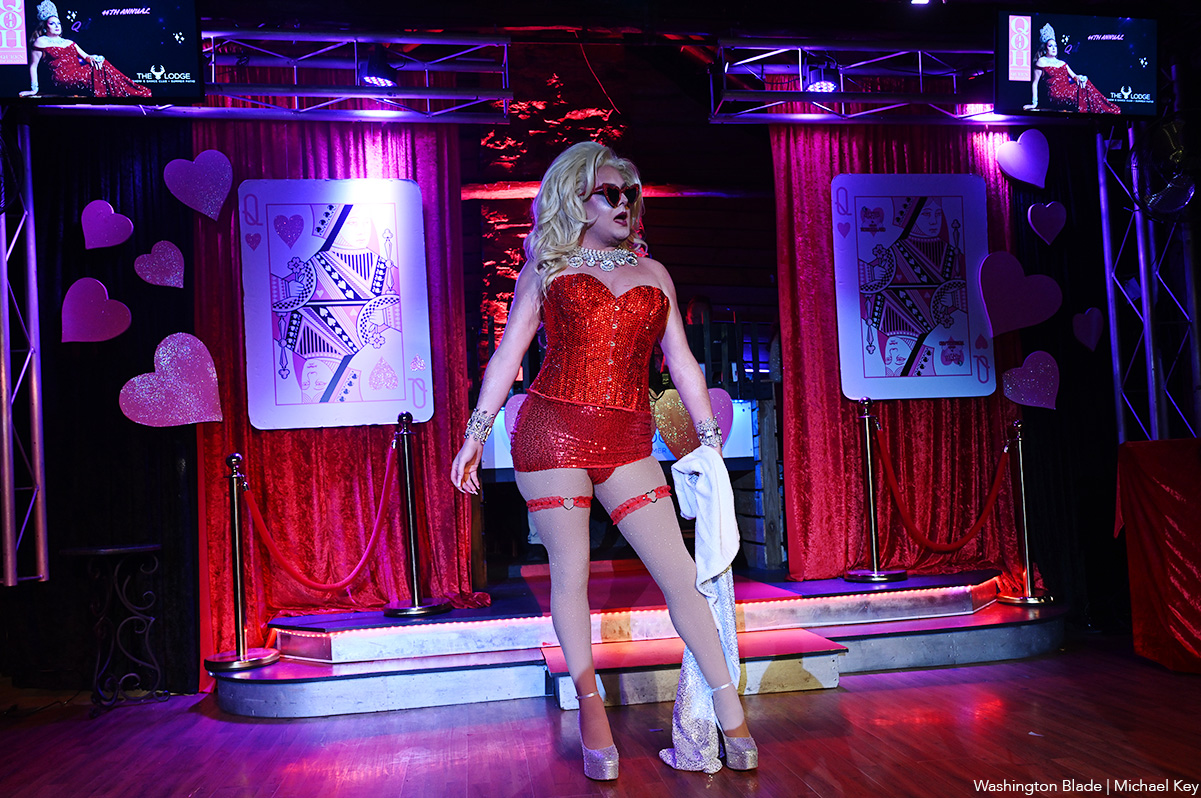
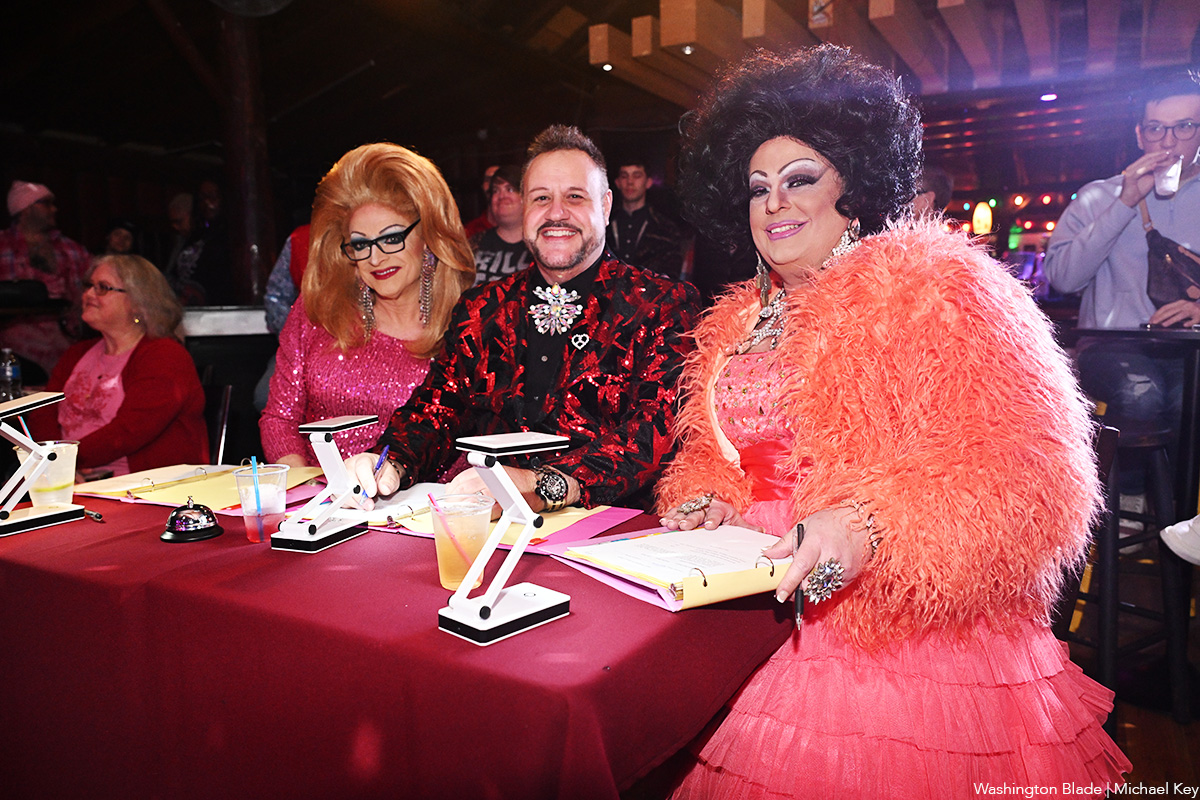
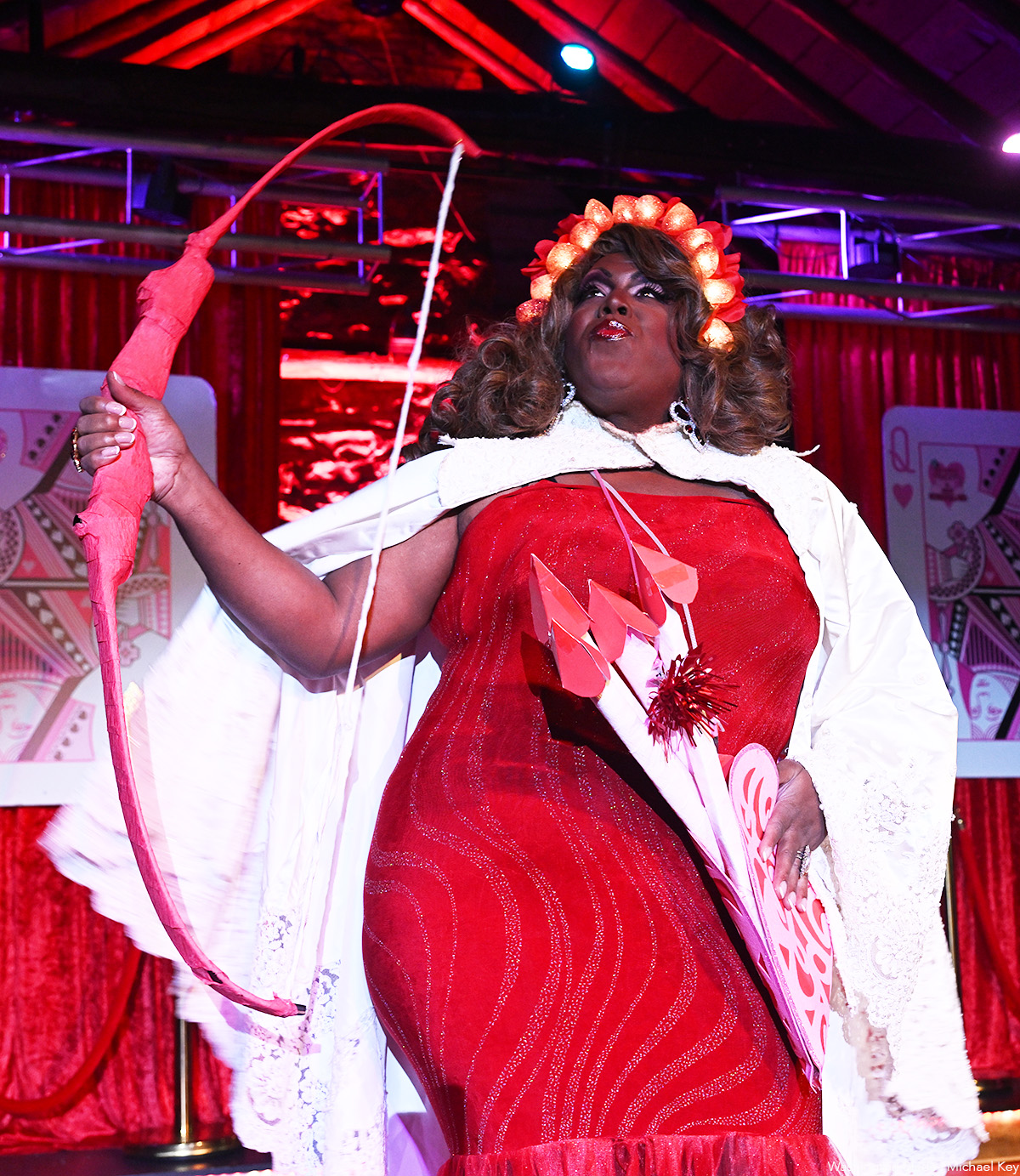
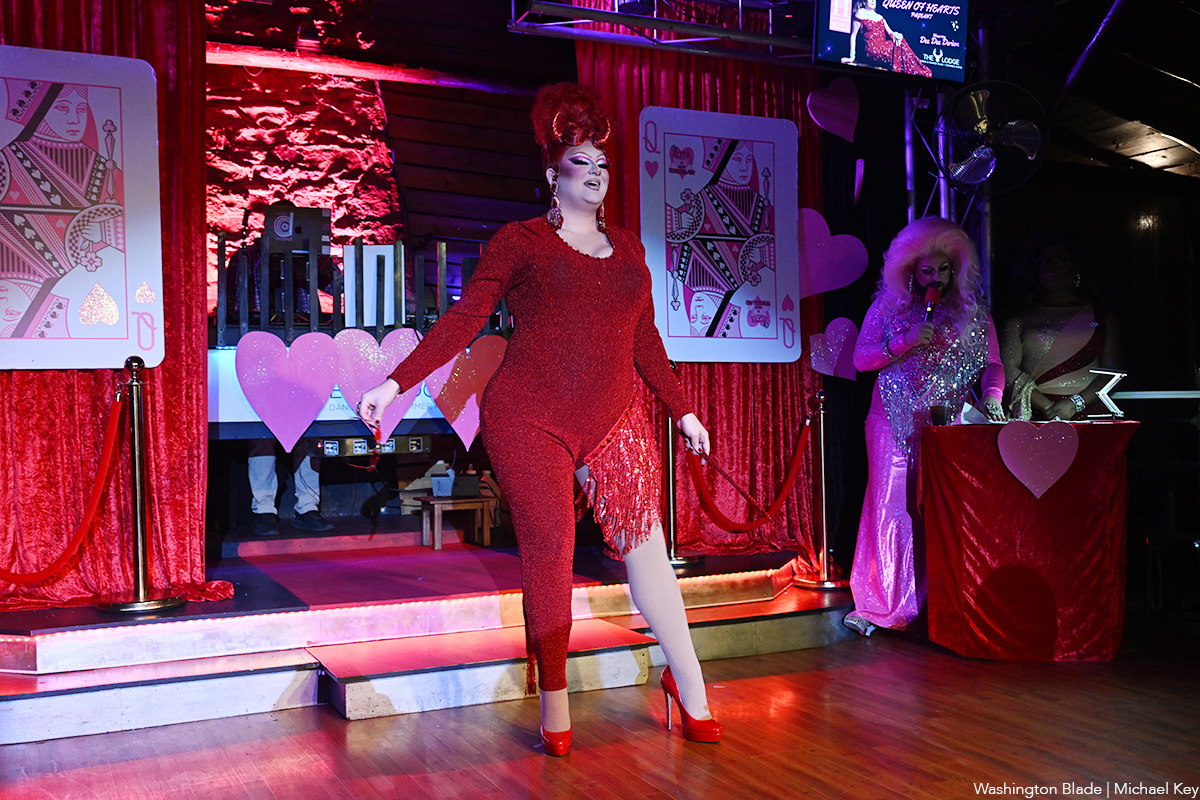
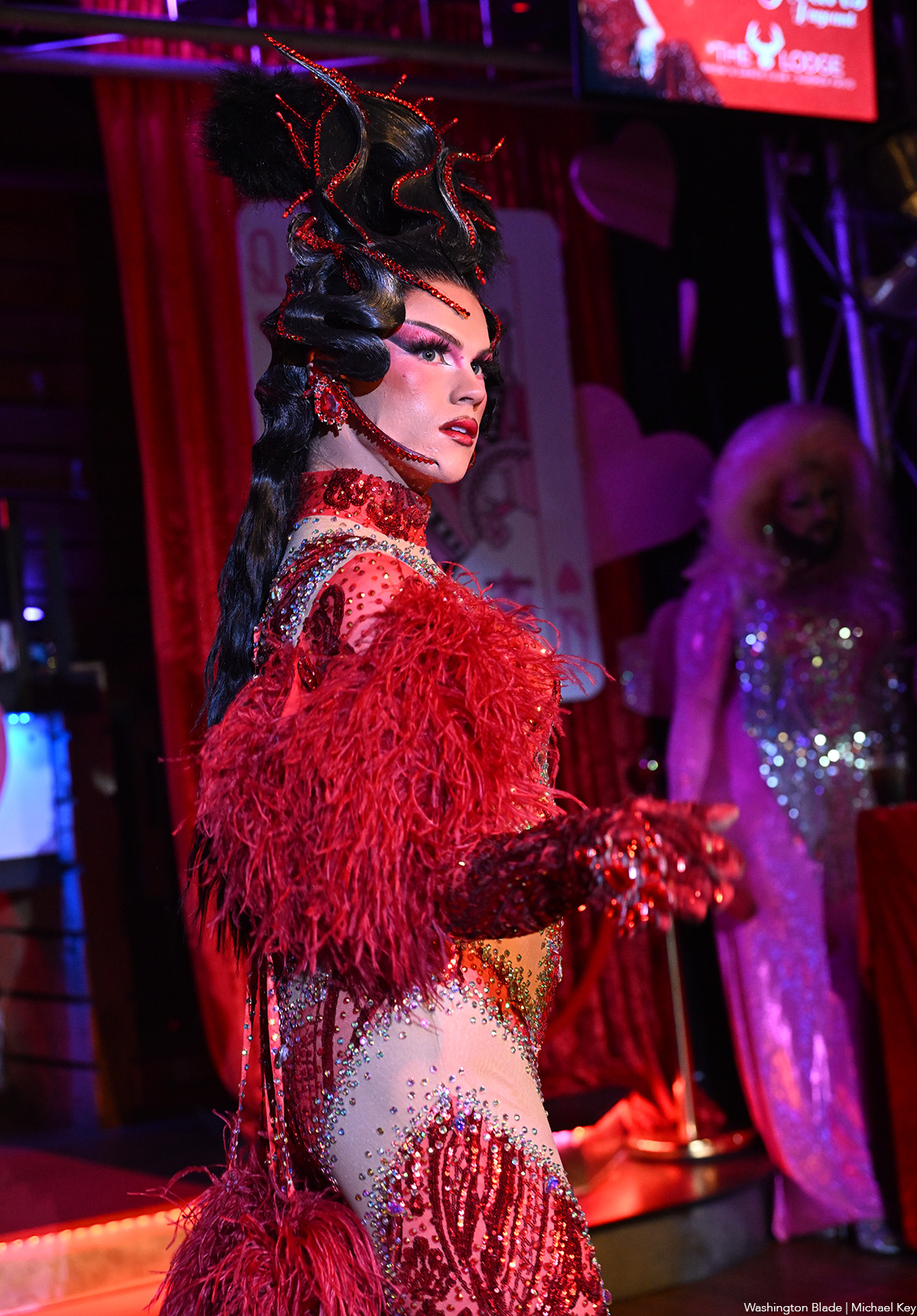
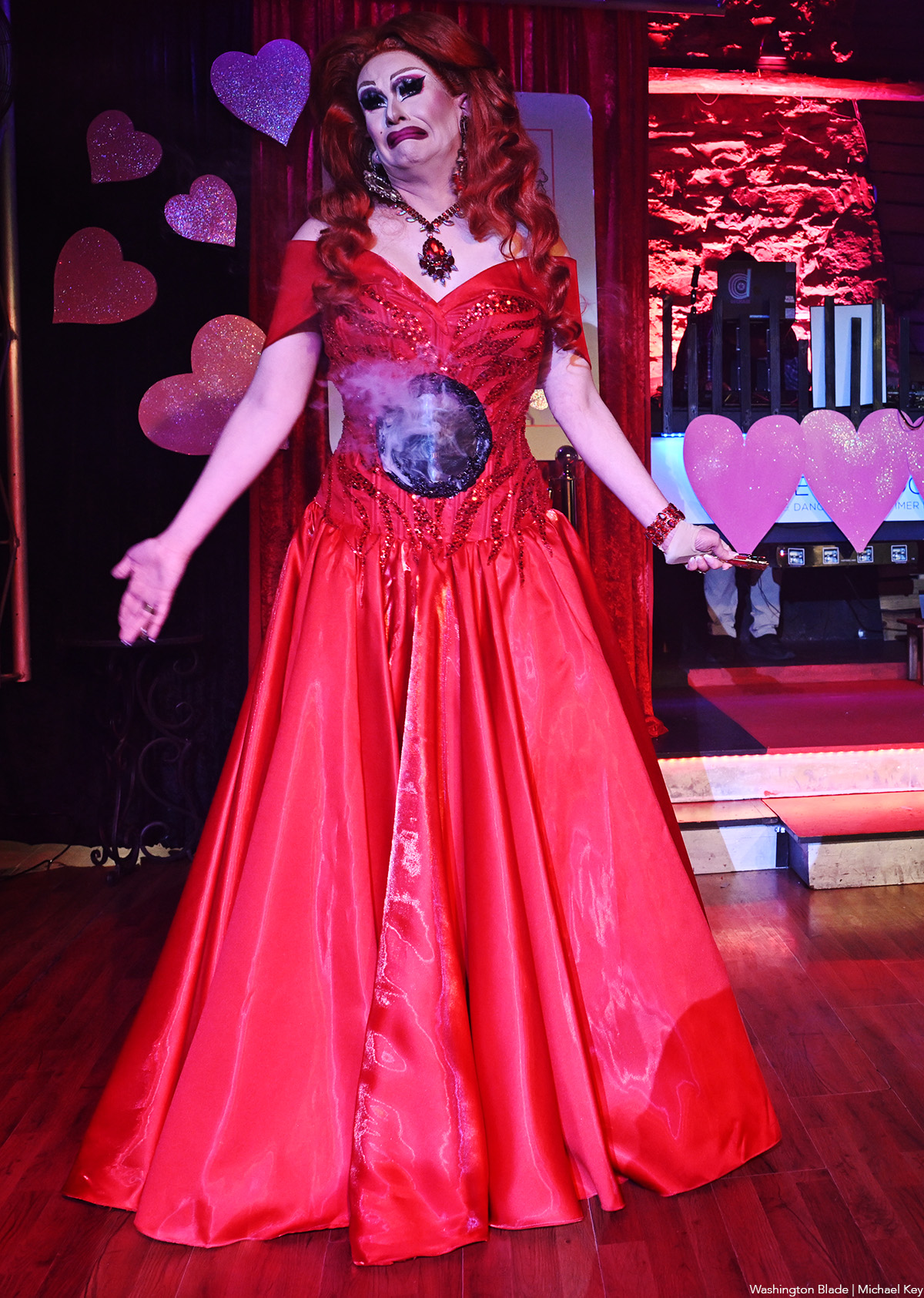
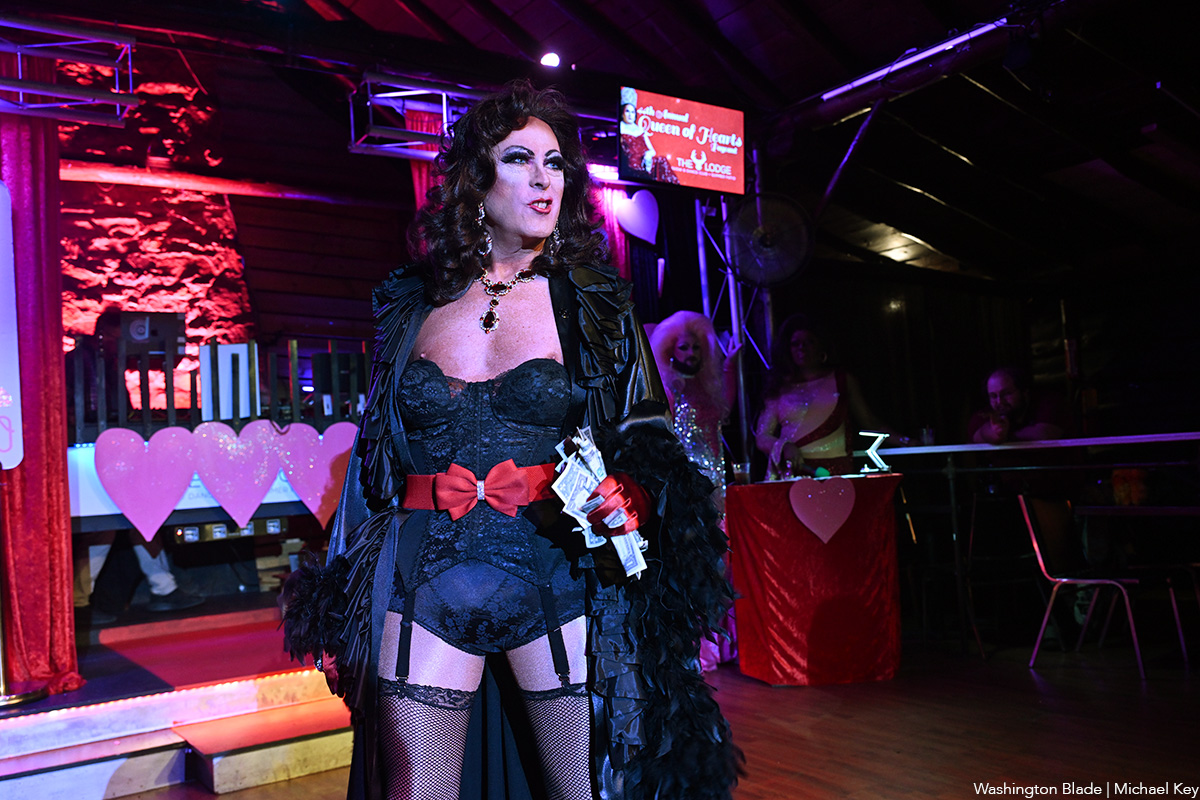
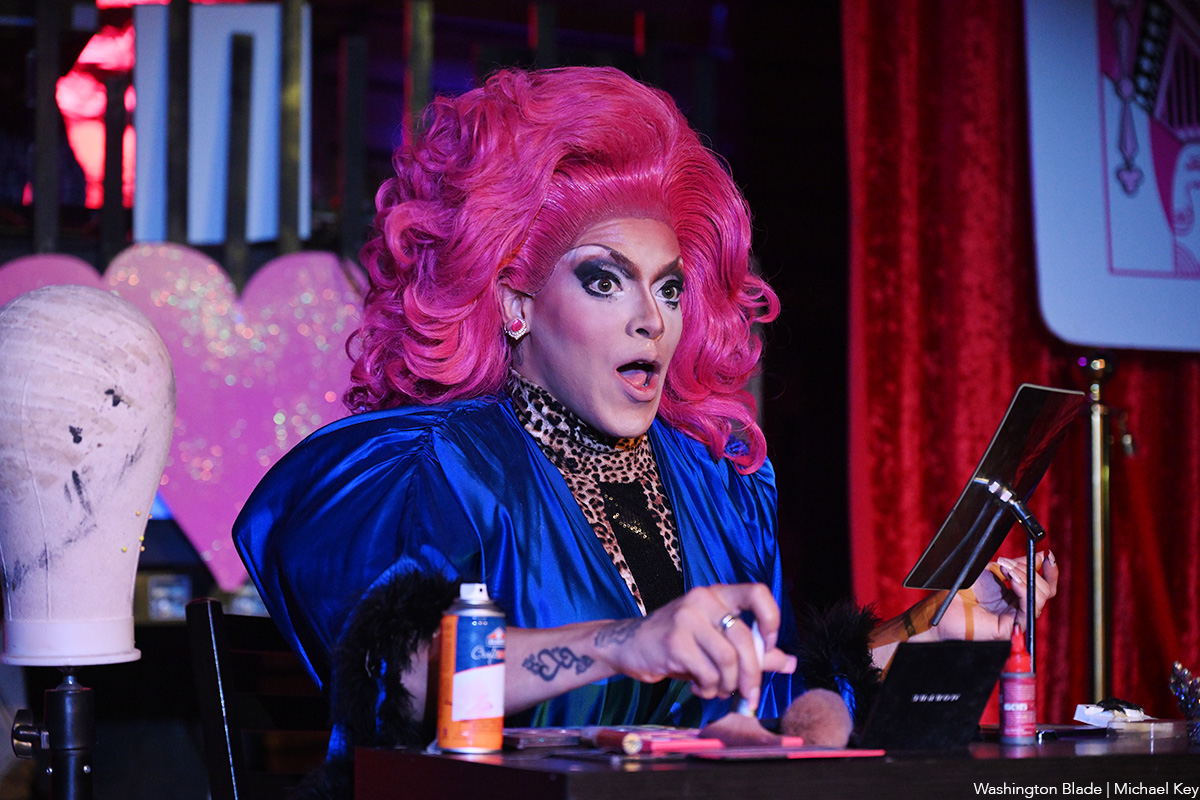
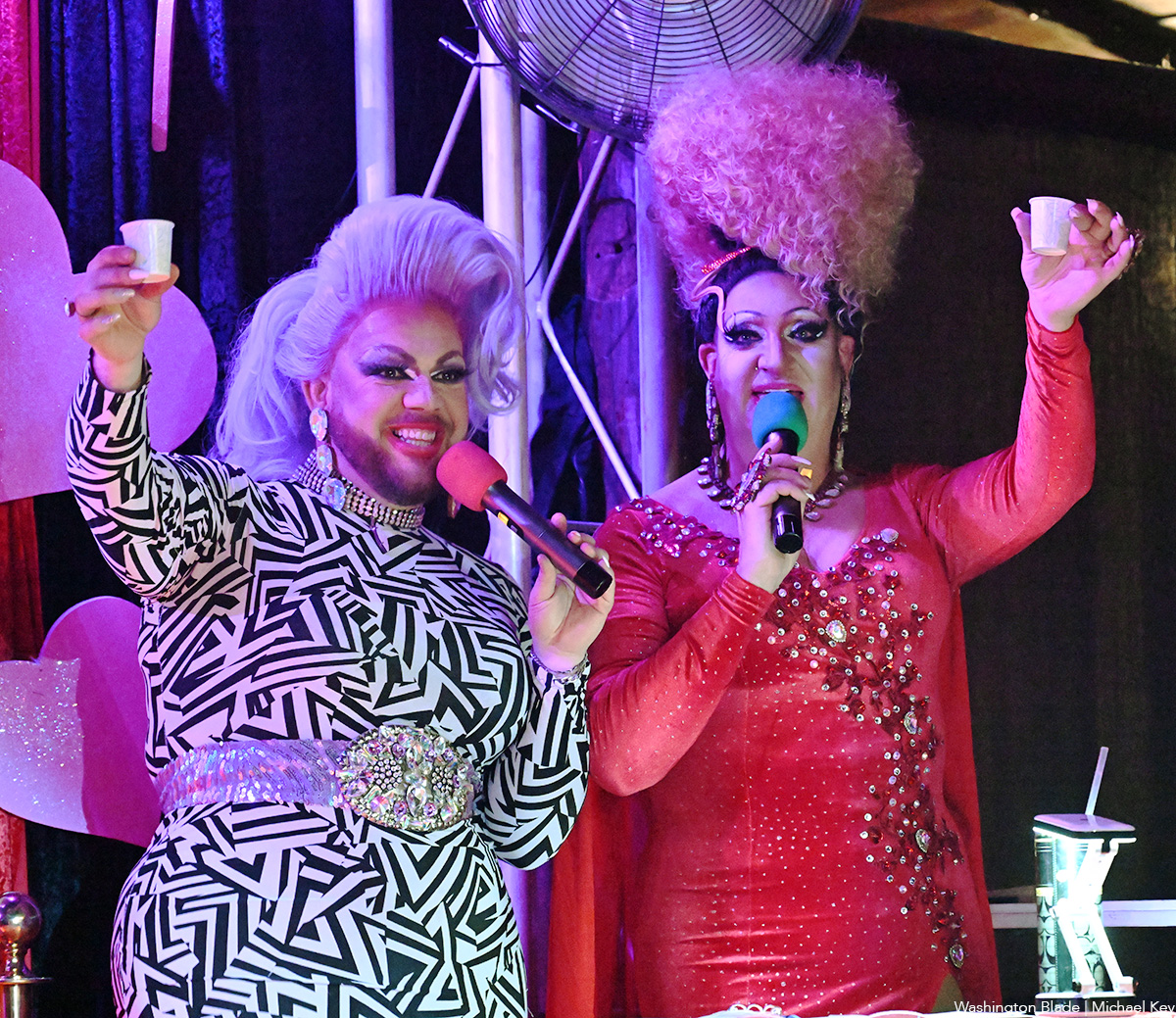
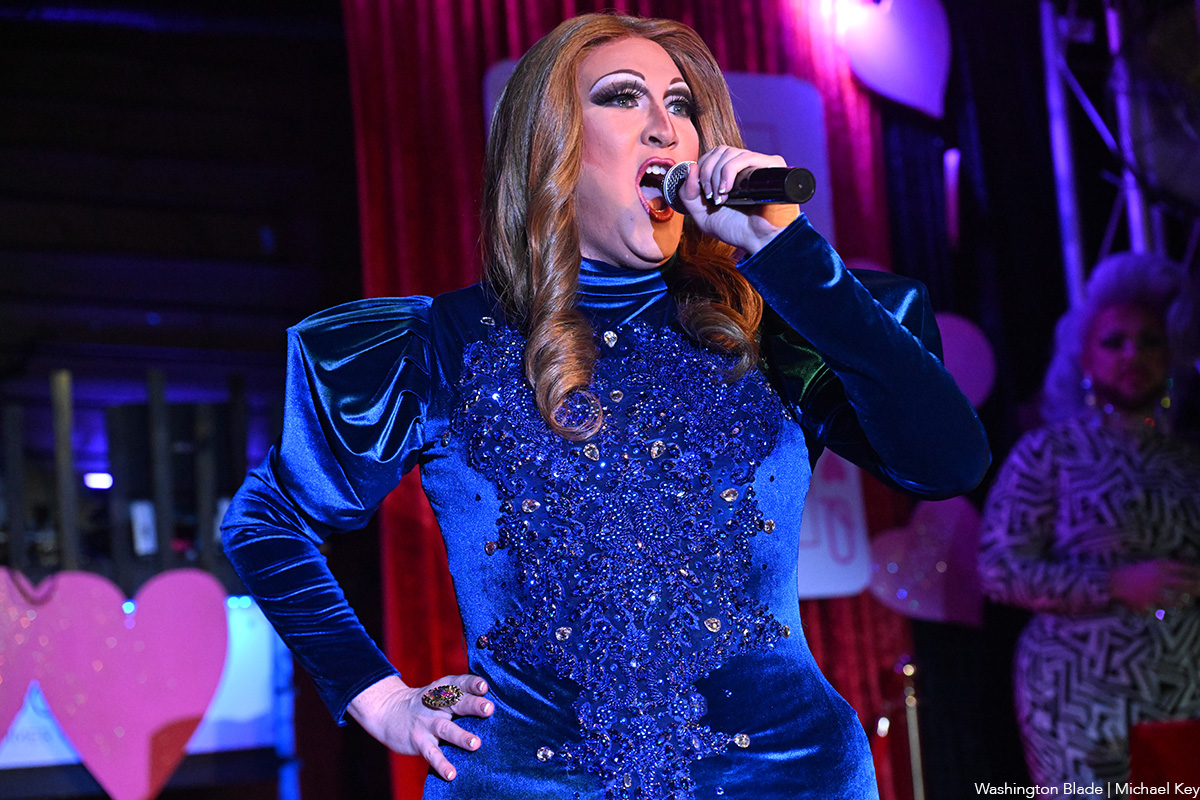
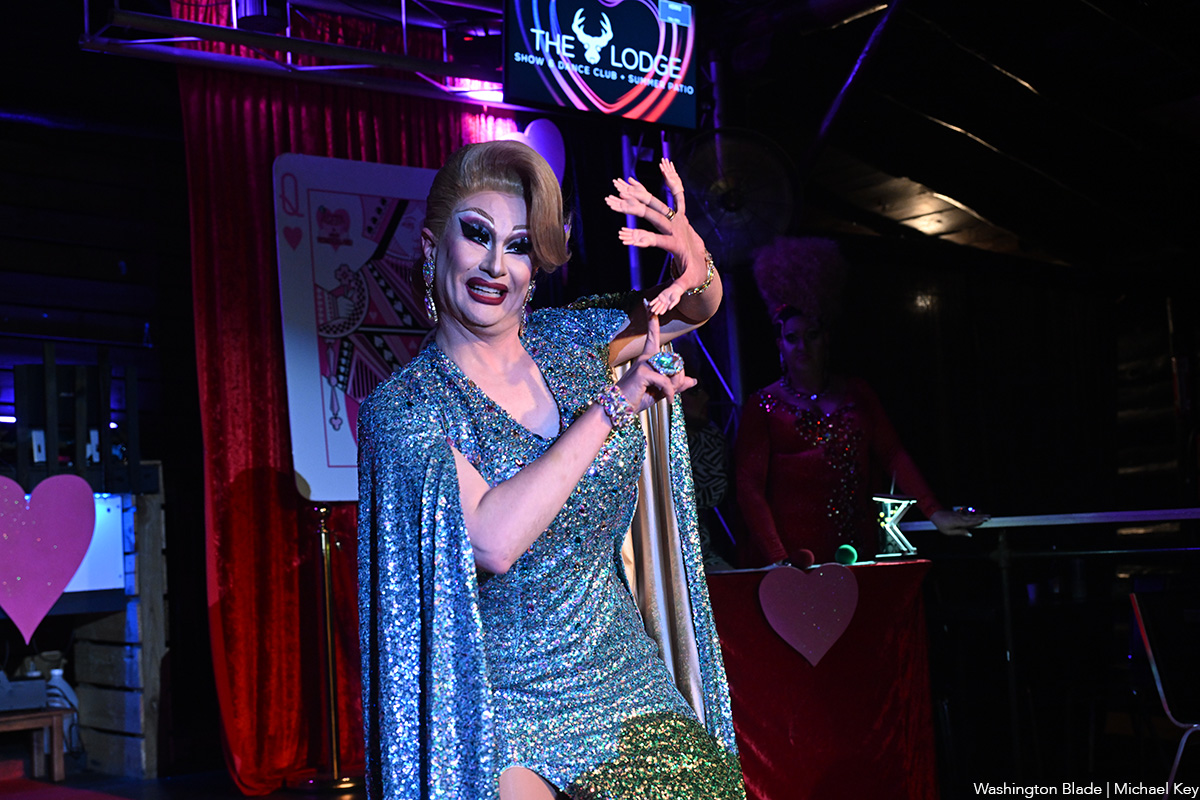
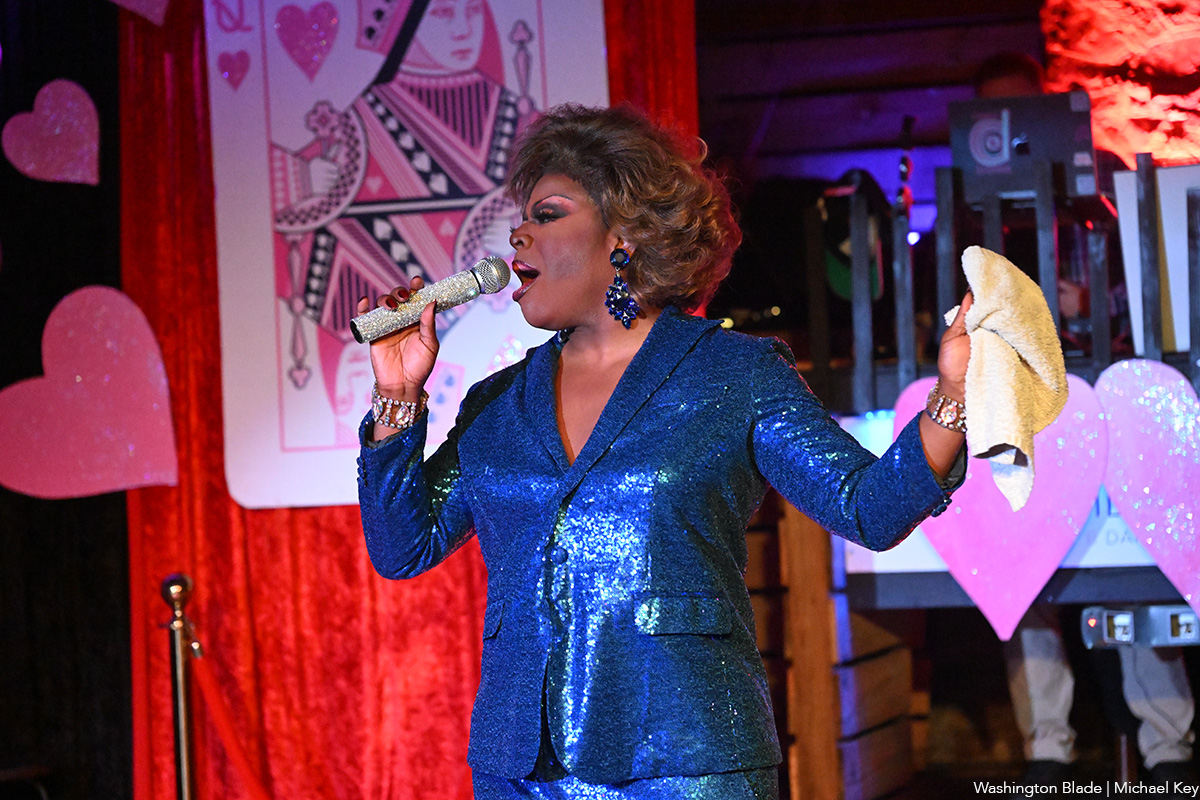
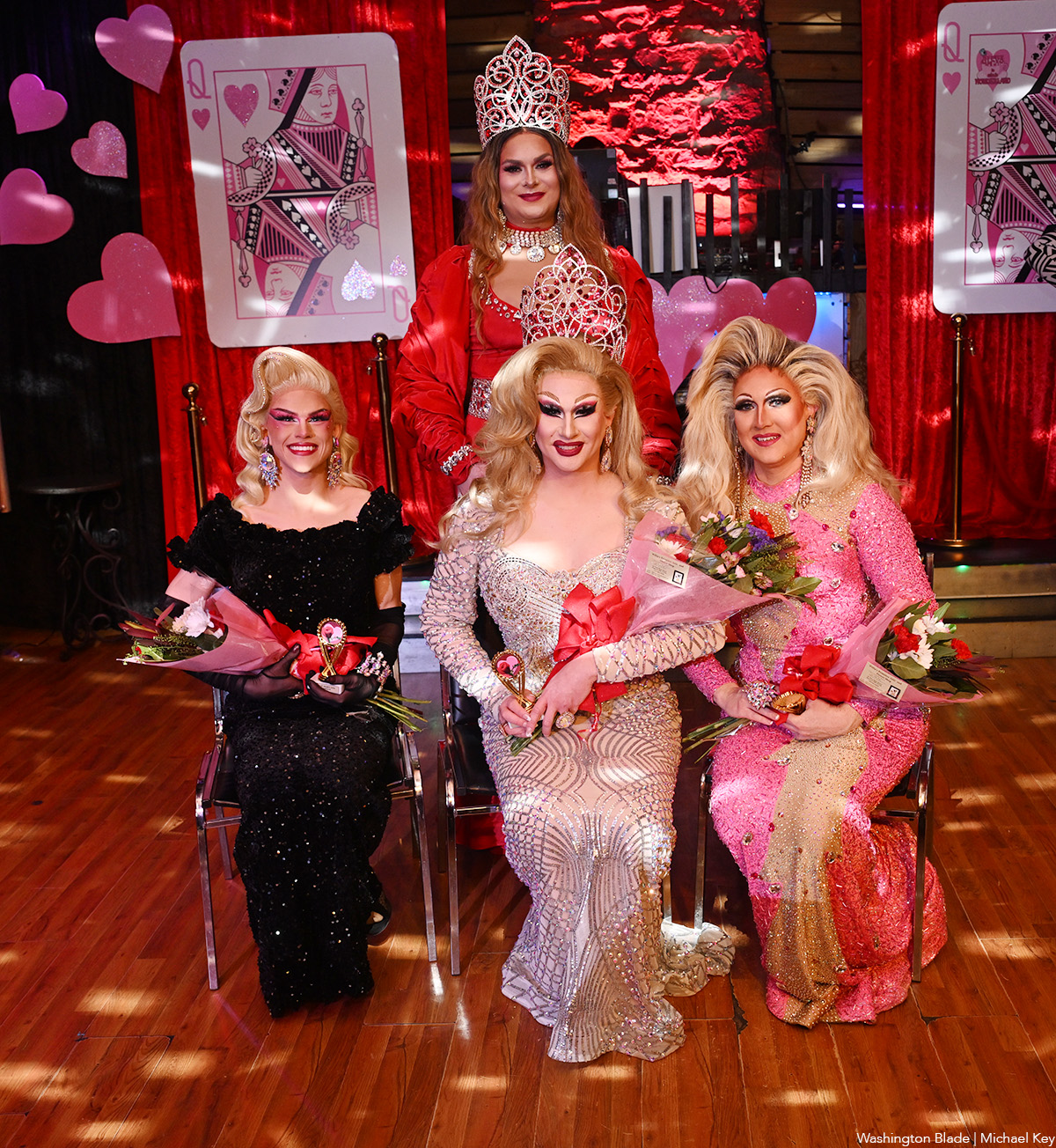
View on Threads

